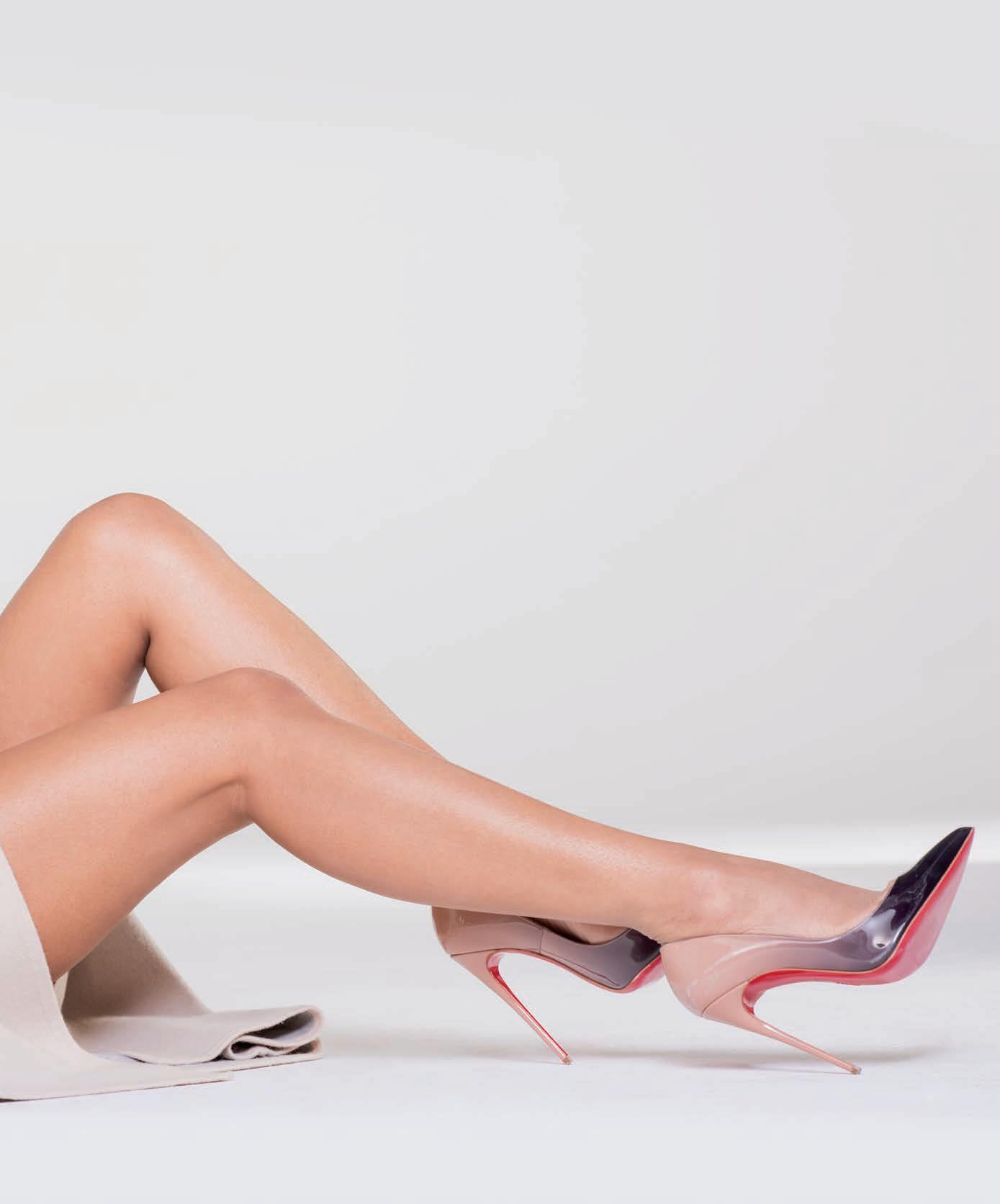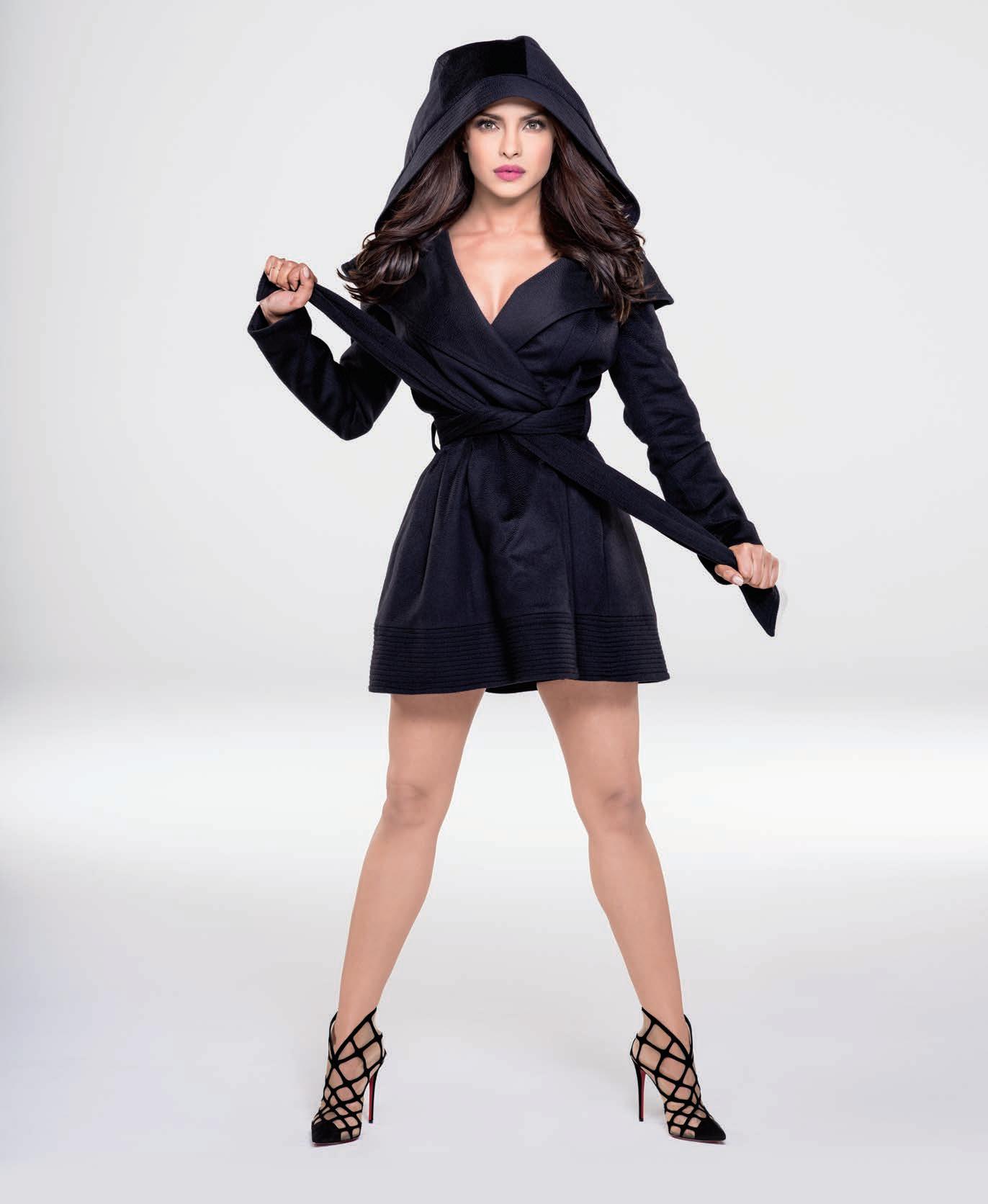
9 minute read
POWERHOUSE
RIYANKA CHOPRA, 33, IS A WOMANONP A
mission. In the blink of a decade, she has starred in nearly
50 Hindi movies, hosted several Indian television shows,
written columns for Elle.com, The New York Times, and The
Times of India, and recorded four songs in America. But Chopra is more than just a strikingly pretty face. A passionate advocate for women’s rights and the education of girls, Chopra’s childhood experience of being bullied pushes her to make positive change for others—and the memory of her beloved father, indelibly scrolled in a tattoo on her right wrist, reminds her to be true to herself. Crowned Miss
World in 2000, Chopra found herself catapulted into the
international spotlight, spurring her to become one of India’s highest–paid actresses and one of the country’s most prolific celebrities. But this was no lucky fluke of fame; Chopra has learned through hard work and determination to trust her inner voice and construct a life built
upon true self-esteem. We caught up with her in Montreal
as she prepares to tackle America, stepping into the lead role on ABC’s new fall series, Quantico.
NEW YOU: How would you describe your character, Alex, on ABC’s new series, Quantico? PRIYANKA CHOPRA: She is sexy and intelligent. She puts things together a lot—definitely a female Jason Bourne. NY: Would you say your character reflects you a little? PC: She’s starting to. I’m a bit of an introvert, but Alex isn’t. She’s my bold alter ego; someone I want to be when I grow up. NY: In one scene, Alex boldly scolds a man with whom she’s previously had sex but who tries to feign ignorance. How does Alex treat men? PC: Her sole focus is to be the best FBI agent ever, and men just come and go. That’s how her character thinks. I’ve always believed in breaking barriers when it comes to picking roles, whether it’s in indie movies or on television. I like being able to break down stereotypes and do the unexpected. That’s what Alex is for me. NY: You have a history of taking on strong female characters in Hindi films. Was it a challenge in that society? PC: In the last decade, both society and films have changed. Female protagonist films are a huge success now. People want to hear about strong girls who take charge of their lives, because young India is like that today. Women don’t want to be treated as inferior anymore. We want our rights and the ability to stand on our own two feet. We want to be treated with the respect we deserve. NY: This speaks to your philanthropy. Why are you passionate about girl’s education and empowering girls to explore? PC: I feel extremely passionate about girls being able to be independent. My parents taught me that; I was raised like that. My parents never differentiated my brother and me. We were raised equally. We were taught to have opinions, make decisions, and have the courage of conviction. I believe girls all over the world [have been] raised to believe that we need to be protected, or need someone else to feel validated and strong. Now we are in a time where we are enough. We are complete as ourselves, and our flaws make us unique. Perfection is boring anyway. As soon as you find and identify your flaws, there’s no one who can be like you. From that you can take your confidence. NY: What about women who lose hope? PC: I don’t believe in hope. I believe in taking charge of your life. I don’t think that we should say, “My life will change and be better.” It’s important to work backwards: Identify what your goal is and work backwards and see what is the route to go from there. I’m not just saying this because I am in a privileged position today. I come from a really small town called Bareilly in India. If I can sit here today doing this interview, talking about an international TV show, and almost 50 Hindi movies behind me, it can happen for any-
Coat by Reiss, reiss.com. Shoes by Christian Louboutin, christianlouboutin.com.
I don’t believe in hope. I believe in taking charge of your life. I was bullied in school, but I got up one day and said, ‘Enough.’

I don’t have any regrets. Each failure has taught me how to never be in that situation again.

Coat by Haney, shophaney.com. Shoes by Christian Louboutin, christianlouboutin.com.
STYLING by Sophia Banks HAIR by Sam Leonardi using Neutrogena Hair Care at Tracey Mattingly MAKEUP by Edward Cruz for Chanel.
one. I had major self-esteem issues growing up and was always very nervous and scared as a kid. I was bullied in school. But I got up one day and said, “Enough.” The color of my skin, the hair I have—there are many things about me that may not be conventional. But as soon as I chose to own it and walk out the door wearing confidence, people looked at me differently. NY: It was brave of you to come to America at 13. Whose decision was it for you to move to Boston? PC: My mom’s sisters and brothers live in America, and I came for vacation with her. I had to go to one of my cousin’s schools, and I was really fascinated by high school in America. I asked my mom if I could stay and study. We sat down one night over dinner and talked out the pros and cons of living in another country without my parents at 13. Since I would be living with my mom’s sister—I insisted I was old enough to do it—my mom said okay. NY: You encountered some bullying in high school. What happened? PC: There was this bunch of girls who were just mean to me. When you are 14 and 15, it’s a big deal to be called “brownie” and hear, “Go back to your country.” I was really scared. I felt I could not deal with it and that I should go home. Ultimately, I am glad I went home, because at 17 I went on to win Miss India and Miss World. Then, the movies happened. Now I am back [in America] with a little more confidence. NY: Do you think it was the bullying that made you so determined in life? PC: Subconsciously, maybe, but not consciously. I just never wanted to feel like that again. I never wanted to feel subjugated. I never wanted to fear that I was not good enough. I think I drove myself to be the best that I can be. If you find that drive, just run. NY: You certainly did run. Forty-nine movies in 13 years! How many people have achieved that record? PC: There are very few people in the world who are blessed with waking up every morning and saying, “Yes, I get to go to work!” I love my job, and know that every day I am going to be doing something different. I feel really blessed and privileged. NY: In the past couple of years you have recorded two songs: “In My City” with Will.i.am and “Exotic” with rapper Pitbull, which debuted at number 16 on Billboard’s Dance Electronic songs. Were you encouraged to sing? PC: My dad’s first love was music. He loved composing music and loved singing it. My earliest memory as a child was waking up to music. My mom and dad would fight over who would play their favorite music. My mom was into the Doors, the Eagles, and Jimi Hendrix, and my dad was into classical, beautiful Hindi songs. Music was a huge part of my life. Before I could speak, I learned to sing the alphabet. NY: Which do you prefer, singing or acting? PC: I just like being creative. I think creativity is something that can get pushed out in so many different forms. I just want to be able to push boundaries when it comes to creative storytelling. NY: Didn’t you want to become an engineer first? PC: Yes, actually. I love math. I’m a complete geek and I believe that the geeks will take over the world one day. I wanted to be an engineer and build planes, and now I fly in them all the time. I was 17 when I became Miss India and movie offers started to come my way. My dad and I had a big chat about it. He said, “You know you have this amazing opportunity, so give yourself a timeline.” I gave myself two years. He said, “Try it, because I don’t want you to ever look back at your life and say, ‘What if I had done it?’” My first movie did well, and I’ve never looked back. NY: Will you be like that with your own children one day? PC: Absolutely. I am like that with my family now, and am very close to all my cousins. There are nine of us on my mom’s side and 11 on my dad’s side. Because we grew up together, we’re more like brothers and sisters. I am like a mom to all of them, and love the idea of a huge family. Having that support and being able to give support is amazing. I will be a mom like that for sure. NY: Did your father put barricades on the windows after you were crowned Miss India? PC: That was before Miss India, right after I came back from America. I was in eleventh grade and in this small city. And I was “Miss Thing.” My dad couldn’t wrap his head around what happened. I went out like a little boy and came back a woman and he was like, “What?” He transformed the house into a jail. Boys followed me home, so he picked me up and dropped me off. It was the funniest thing. NY: What do you look for in a man? PC: I have to be able to look up to a man. I am an achiever and, therefore, I don’t think I can be with anyone who is not. I like men with drive, who like to achieve and be better than the best. Someone who can make me laugh. It’s so important. He has to have a sense of humor and smarts. I cannot stand unintelligent men. It’s a pet peeve, those guys who can’t stop talking about their new shoes or dumb things. I need a guy to stimulate me mentally. I have high standards. I need a guy who can deal with the fact that I am a smart, strong girl with an opinion. NY: We hear you love Audrey Hepburn? Why? PC: She was classy. That’s how women should be— elegant, classy, and charming. I guess I am a little old fashioned like that. I do believe that girls should be shy but a little strong, unpredictable, and still classy. NY: In your philanthropy, what moment has touched your heart the most? PC: I’m moved by a baby’s toothless smile or a story from an old person. I get touched by friends who are happy, perhaps someone who just got engaged. Little things like that. My philanthropy doesn’t come from thinking of it as a charity. It’s a way of life. I feel I’m in a privileged position and on a platform. Even if people don’t follow what I say, they will hear me.









